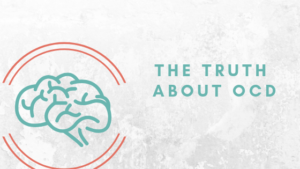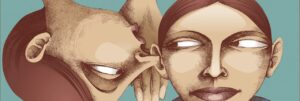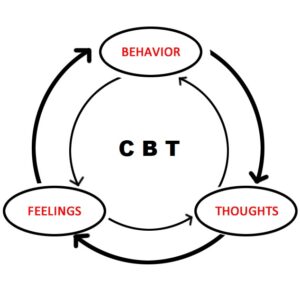OCD and schizophrenia are two mental health disorders that often go hand in hand. Many people with OCD also have schizophrenia and vice versa. In this blog post, we will discuss the similarities and differences between OCD and schizophrenia, as well as the treatment options available for both conditions.
Contents
About OCD 
OCD, or obsessive-compulsive disorder, is a mental health condition that causes people to have intrusive and unwanted thoughts (obsessions) and/or to repeat certain behaviors (compulsions) over and over. OCD can be a very debilitating condition, making it difficult for people to function in their daily lives. Symptoms of OCD include:
- Excessive hand-washing
- Checking things repeatedly
- Arranging things in a certain order
- Counting or doing other rituals
- Avoiding certain places or objects
- Having intrusive thoughts about harm coming to oneself or others
- Hoarding objects
There are a few risk factors for OCD that have been identified:
- Genetics: OCD can run in families, so if you have a first-degree relative with OCD, you may be more likely to develop the disorder.
- Environment: Stressful life events, such as the death of a loved one, can trigger OCD.
- Brain structure and function: Abnormalities in certain areas of the brain have been linked to OCD.
- Personality: People with OCD often have perfectionistic tendencies and may be overly concerned with orderliness.
- Socioeconomic factors: OCD is more common in people from higher socioeconomic backgrounds.
About Schizophrenia 
Schizophrenia is a mental disorder that affects a person’s ability to think, feel, and behave clearly. It can cause delusions and hallucinations.
People with schizophrenia may seem like they have lost touch with reality. The disorder can make it hard for them to keep a job or take care of themselves. Its symptoms include:
- Delusions: these are false beliefs that a person holds onto even when presented with evidence to the contrary.
- Hallucinations: these can involve seeing, hearing, or feeling things that are not there.
- Disorganized thinking: this can manifest as a person having trouble concentrating or following a train of thought.
- Disorganized behavior: this can include childlike silliness or agitation and restlessness.
- Negative symptoms: refer to a flattening of emotions or a lack of interest in life.
Below are mentioned some of the risk factors of schizophrenia:
- Family history: Schizophrenia often runs in families, so if you have a close relative with the disorder, your risk is higher.
- Prenatal problems: Schizophrenia has been linked to prenatal exposure to viruses or malnutrition.
- Drug abuse: People who abuse drugs are more likely to develop schizophrenia.
- Brain changes: Schizophrenia may be associated with changes in the structure or function of the brain.
- Stressful life events: Schizophrenia is more common in people who have experienced trauma or other stressful life events.
What Are The Differences?
There are some key differences between OCD and Schizophrenia.
OCD is characterized by obsessions, which are intrusive and unwanted thoughts, images, or impulses that cause anxiety or distress. Schizophrenia, on the other hand, is characterized by delusions, which are false beliefs that are not based on reality.
OCD can also cause compulsions, which are repetitive behaviors or mental rituals that a person feels they must do to reduce anxiety. Schizophrenia may also cause hallucinations, which are false perceptions that a person experiences.
OCD is typically treated with a combination of medication and cognitive-behavioral therapy, while schizophrenia is typically treated with medication and psychotherapy.
In OCD, the person is aware that their obsessions and compulsions are excessive and irrational, but they cannot control them. In schizophrenia, the person may not be aware that their delusions are false.
What Are The Similarities?
OCD and schizophrenia share many similarities as well. The most notable is that both disorders involve obsessions and compulsions.
People with OCD often recognize that their obsessions and compulsions are irrational, but they feel powerless to stop them. Schizophrenia sufferers also experience intrusive thoughts, images, or voices (hallucinations). These hallucinations can be very distressing and may cause the individual to act out to make them stop. Like OCD sufferers, people with schizophrenia often recognize that their hallucinations are not real, but they feel powerless to stop them.
Other similarities between OCD and schizophrenia include:
- Both disorders can be debilitating and significantly interfere with an individual’s ability to function in everyday life.
- Both disorders can cause social isolation and withdrawal.
- Both disorders can be accompanied by depression, anxiety, and/or substance abuse.
What Are The Consequences?
OCD and schizophrenia can have several consequences. These can include:
Problems With Work, School
OCD and schizophrenia can result in problems with work and school for several reasons. First, both disorders can interfere with concentration and focus. This can make it difficult to complete tasks or follow instructions. For example, someone with schizophrenia might be so distracted by hallucinations or paranoid thoughts that they can’t focus on their work.
Another reason OCD and schizophrenia can interfere with work and school is that both disorders can cause social withdrawal. People with OCD may avoid situations that trigger their OCD symptoms, which can make it difficult to participate in class or work meetings.
Social Interactions
OCD and schizophrenia are both mental disorders that can cause problems with social interactions. This can make it hard for them to interact with others because they may be focused on their OCD thoughts and behaviors.
Schizophrenia can cause people to have delusions and hallucinations that make it hard for them to interact with others. They may also have trouble thinking clearly and may act out in bizarre ways. This can make it hard for them to hold conversations, understand what others are saying, or maintain eye contact.
Financial Problems
OCD and schizophrenia can result in financial problems for several reasons. First, both disorders can interfere with a person’s ability to work. OCD can cause a person to miss work due to OCD-related compulsions and rituals, while schizophrenia can cause a person to miss work due to psychotic symptoms such as hallucinations and delusions. In addition, both disorders can lead to job loss due to the symptoms mentioned above.
Substance Abuse
OCD and schizophrenia often result in substance abuse. OCD can lead to drug addiction because people with OCD often turn to drugs or alcohol to relieve their anxiety. Schizophrenia can also lead to substance abuse, as people with the disorder may use drugs or alcohol to self-medicate.
For example, people with schizophrenia may use marijuana to relieve their hallucinations or delusions while people with OCD may use alcohol to ease their anxiety.
Physical Health Problems
OCD and schizophrenia can both result in physical health problems. OCD can cause problems with digestion, sleep, and energy levels. Schizophrenia can cause problems with weight, metabolism, and heart health. Both OCD and schizophrenia can also result in weakened immune systems.
For example, OCD can cause someone to wash their hands so much that they develop skin problems or allergies. Schizophrenia can cause someone to neglect their hygiene, which can lead to infection.
Problems In Relationships
OCD and schizophrenia can both result in problems in relationships. OCD can cause a person to be overly critical of their partner, or to constantly doubt their relationship. This can lead to arguments and conflict and can make it difficult for the OCD sufferer to maintain a healthy relationship.
Schizophrenia can also cause problems in relationships, as the illness can make it difficult for a person to communicate effectively, or to manage their emotions. This can lead to misunderstandings and conflict and can make it difficult for the schizophrenic person to maintain a healthy relationship.
Loss Of Mental Peace And Calm
OCD and schizophrenia are two mental disorders that can have a profound effect on an individual’s life. Both conditions can result in the removal of mental peace and calm. OCD can cause a person to obsessively worry about things that are not important, while schizophrenia can cause a person to lose touch with reality. OCD can also cause a person to engage in repetitive behaviors, while schizophrenia can cause a person to hear voices or have delusions.
Suicide
OCD and schizophrenia can both result in suicide because of the mental and emotional distress they cause. Those suffering from either condition may find suicide as the final attempt because their obsessions, hallucinations, and delusions can be so distressing that they feel they need to escape them.
How Can Therapies Help?
There are many different types of therapies that can help manage OCD and schizophrenia. Some of the most common include:
Cognitive Behavioral Therapy 
CBT is a type of psychotherapy that helps people manage and overcome OCD and schizophrenia. It teaches people how to change their thinking and behavior to improve their symptoms. OCD and schizophrenia are both mental disorders that can cause a person to experience delusions, hallucinations, and OCD symptoms.
CBT is an effective treatment for both OCD and schizophrenia. CBT is a structured, short-term therapy that is typically provided in weekly sessions for 12-20 weeks.
Exposure and Response Prevention Therapy
ERP is a type of therapy that helps people manage and overcome OCD and schizophrenia. ERP is a treatment that helps people learn to control their OCD and schizophrenia by exposure to their fears and anxiety-provoking situations. The treatment involves gradually exposing people to their fears and anxiety-provoking situations in a safe and controlled environment.
For example, a person with OCD might be exposed to objects or situations that trigger their OCD, such as dirt or germs. The exposure is usually done in a gradual and controlled manner so that the person can learn to control their OCD.
Similarly, a person with schizophrenia might be exposed to situations that trigger their schizophrenia, such as social situations or loud noises. The exposure is usually done in a gradual and controlled manner so that the person can learn to control their schizophrenia.
Group Therapy
Group therapy can be an incredibly effective tool for managing OCD and schizophrenia. In group therapy, individuals with OCD and schizophrenia can share their experiences with others who understand what they are going through. This can help reduce the feelings of isolation and loneliness that often accompany these disorders.
Additionally, group therapy provides a forum for developing coping and problem-solving skills. Through this therapy, individuals with OCD and schizophrenia can learn how to better manage their symptoms and improve their overall quality of life.
Family Therapy
Family therapy can help manage OCD and schizophrenia by providing support to the family members and teaching them how to cope with the illness.
There are some general principles for this type of therapy. The first is to create a safe and supportive environment. This means that family members should feel free to express their feelings and thoughts without judgment. It is also important to respect each family member’s privacy and to encourage open communication.
Another important principle of family therapy is to focus on the present. This means that families should not try to dwell on the past or worry about the future. Instead, they should focus on the here and now and on dealing with OCD and schizophrenia.
Finally, family therapy should be goal-oriented. This means that families should work together to set realistic goals and then take steps to achieve those goals. OCD and schizophrenia can be difficult illnesses to deal with, but family therapy can help.
Art Therapy
Art therapy can be very helpful in managing OCD and schizophrenia. It can help to ground the individual and provide a creative outlet for OCD compulsions and intrusive thoughts. It can also help to improve self-esteem and provide a sense of accomplishment.
For individuals with schizophrenia, art therapy can provide a way to express their thoughts and feelings that may be difficult to communicate verbally. It can also help to reduce anxiety and provide a sense of calm.
The therapist can provide the individual with a piece of clay and ask them to sculpt something while they are washing their hands. This can help to ground the individual and provide a creative outlet for their OCD. This can be a very powerful experience that can help the individual to understand their OCD and work through it healthily.
Art therapy can also be very helpful for individuals with schizophrenia. The therapist can help the individual to interpret their artwork and what it might represent for them. This can be a very powerful experience that can help the individual to understand their schizophrenia and work through it healthily.
Occupational Therapy
Occupational therapy involves assisting patients in developing the skills needed to live as independently as possible. It can help manage and overcome OCD and schizophrenia in several ways.
First, occupational therapists can help patients develop healthy routines and coping mechanisms. This can involve developing a structured daily schedule, teaching patients how to meditate or practice relaxation techniques, and helping them identify and avoid triggers.
In addition, occupational therapists can provide support and guidance to patients and their families. This may involve helping families develop a support network, providing education about OCD and schizophrenia, and assisting with financial and practical matters. By providing support and guidance, occupational therapists can help patients and their families better manage OCD and schizophrenia.
How Can Medications Help? 
OCD and schizophrenia are both mental disorders that can be treated with medication. Some of the common medications include :
- Selective serotonin reuptake inhibitors (SSRIs)
- Atypical antipsychotics
- Tricyclic antidepressants
These medications can help to relieve OCD and schizophrenia symptoms by :
- Regulating mood
- Reducing anxiety
- Improving sleep
- Restoring energy and motivation
It’s important to consult your doctor before you start taking any of such prescriptions. Furthermore, medications can help to alleviate symptoms and improve quality of life, but it is important to also seek out other forms of treatment, such as therapy, to help manage OCD and schizophrenia.
How Can Self-Care Strategies Help? 
OCD and schizophrenia are both mental disorders that can be very debilitating. However, some self-care tips can help manage and overcome OCD and schizophrenia. Some self-care tips can help manage and overcome OCD and schizophrenia. These tips include:
- Getting enough sleep: Sleep is important for overall health and well-being. It can also help reduce stress and anxiety.
- Eating a healthy diet: Eating a nutritious diet can help improve mood, energy levels, and overall health.
- Exercising regularly: Exercise can help reduce stress, improve mood, and increase energy levels.
- Practicing relaxation techniques: Relaxation techniques such as meditation or deep breathing can help reduce stress and anxiety.
- Avoiding drugs and alcohol: Drugs and alcohol can worsen OCD and schizophrenia symptoms.
- Connecting with others: Connecting with family and friends can help reduce isolation and loneliness.
- Remaining busy: Keeping busy with activities can help distract from OCD and schizophrenia symptoms.
Conclusion
OCD can lead to many different problems in a person’s life, including job performance, social interactions, and even suicidal thoughts. Schizophrenia, on the other hand, can be extremely debilitating, preventing people from leading normal lives.
If you or someone you know is struggling with either OCD or schizophrenia, it is important to seek professional help. OCD and schizophrenia can be extremely difficult to deal with, but with the right treatment, it is possible to live a normal, happy life. The only hindrance is the delay in seeking professional OCD and schizophrenia treatment. So if you or someone you know is struggling, don’t delay- get help today.
Professional Guidance is the first step to moving toward your healing journey. You can try reaching Therapy Mantra to seek expert help in the comfort of your own home. Our therapists will help you get a solution to manage and overcome your problem. You can book your online therapy and talk directly to your assigned mentor. You may also download our free OCD treatment app on Android or iOS.









